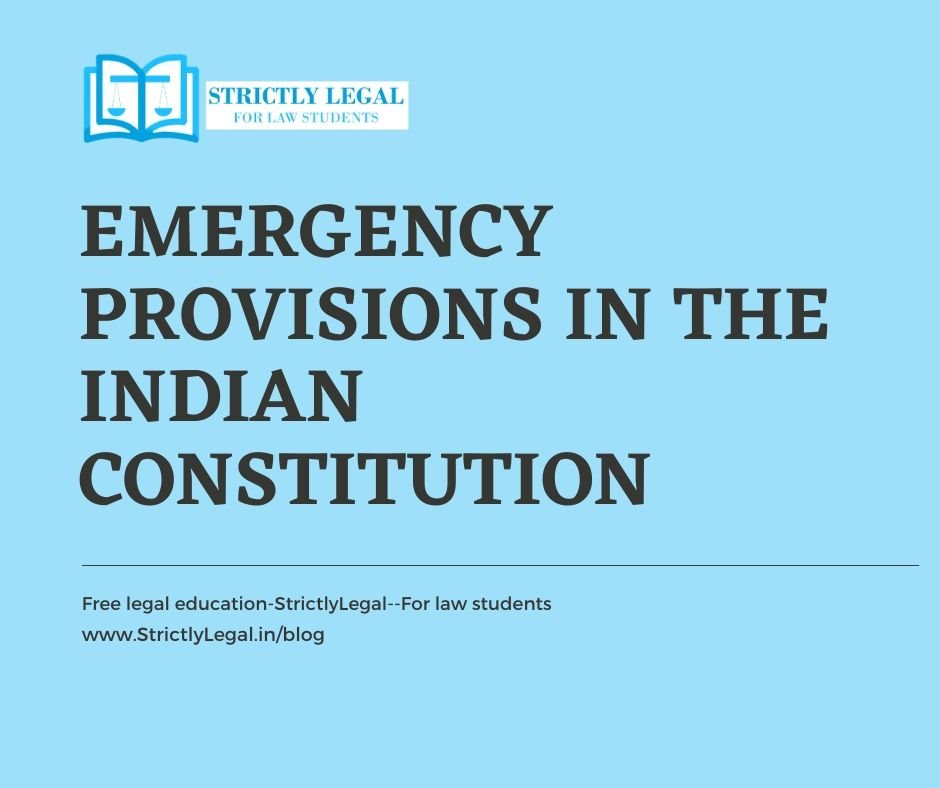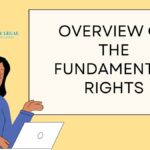Emergency as defined in Black Law’s dictionary is a failure of the social system to deliver reasonable conditions of life.
India’s form of government is largely federal but it could turn into a unitary system of government with one proclamation from the President of India. That is a proclamation of Emergency.
Emergency Provisions
Emergency, as is defined in the constitution of India, is classified majorly into three types:
- National Emergency
- State Emergency
- Financial Emergency
The articles 352 to 360 deals with these provisions namely:
- Article 352 of the Indian Constitution: Proclamation of Emergency.
- Article 353 of the Indian Constitution: Effect of Proclamation of Emergency.
- Article 354 of the Indian Constitution: Application of provisions relating to the distribution of revenues while a proclamation of emergency is in operation.
- Article 355 of the Indian Constitution: Duty of the Union to protect States against external aggression and internal disturbance.
- Article 356 of the Indian Constitution: Provisions in case of failure of constitutional machinery in State.
- Article 357 of the Indian Constitution: Exercise of legislative powers under Proclamation issued under Article 356.
- Article 358 of the Indian Constitution: Suspension of provisions of article 19 during Emergencies.
- Article 359 of the Indian Constitution: Suspension of the enforcement of the rights conferred by Part III or Fundamental rights during emergencies.
- Article 360 of the Indian Constitution: Provisions as to Financial Emergency.
Before we discuss further on the topic of Emergency provisions in the Indian Constitution, it is necessary we learn the meaning of the terms mentioned below and FAQ:
Types of Emergency
Under the Constitution of india, Emergency can be of three types:
National Emergency Under Article 352
Things to keep in mind
As defined under article 352, National Emergency may be proclaimed by the president if he is satisfied of a grave and imminent danger whereby the security of India or of any part of the territory thereof is threatened, whether by war or external aggression or armed rebellion.
- Such a proclamation may be for any part of India or the whole of India.
- A further proclamation may be issued by the president to revoke the emergency.
- The proclamation of emergency can only be invoked if the cabinet consisting of the Prime Minister and other minister is of the opinion by writing to the president that such a danger persists so as to invoke emergency.
- An emergency once invoked by the president shall expire at the end of one month if not passed by a resolution by both the houses from one month of its proclamation from the President of India. However, if the parliament is not in session or is dissolved within the prescribed time from ratification and only the lower house that is the Council of States or the Rajya Sabha has passed but not the upper house or house of the people i.e the Rajya Sabha then the resolution must be passed within one month from the first sitting of the house of people or the Lok Sabha after it assembles. Otherwise, the emergency is automatically revoked.
- Once the resolution is passed by both the houses of the parliament i.e by the Council of States (Rajya Sabha) and the House of People (Lok Sabha) it shall remain in force unless revoked for a period of six months.
- The resolution may be passed by either House of Parliament only by a majority of the total membership of that House if ratifying the order of the President. And by not less than 1/10th of the members present and voting if its a resolution extending the emergency beyond the time period of six months.
- It must be noted that the President is bound to revoke the emergency if the parliament disapproves or fails to pass a resolution approving the same within the prescribed time.
- A notice may also be served by not less than 1/10th of the total members of the house of people i.e the Lok Sabha to the speaker if the parliament is in session or to the president if the parliament is not in session.
State Emergency Under Article 356
As defined in the Constitution of India under article 356 that if the President of India is satisfied on a report of a governor or otherwise that the law and order in the state is not in position and a situation has arisen in which the government of the State cannot carry on in accordance with the provisions of the Constitution, he may declare a state emergency as to
- Assume functions of the state government and any other body or authority in the state except the state legislature and the high court.
- Declare that the powers of the state legislature to be exercised by the parliament or under the authority of the parliament.
Things to remember:
- Any such Proclamation may be revoked or varied by a subsequent Proclamation.
- Every such proclamation automatically revokes at the expiration of sixty days (2 months) from the date of proclamation unless a resolution is passed by both the houses of the Parliament approving the same.
- An emergency once invoked under article 356 by the president shall expire at the end of two months if not passed by a resolution by both the houses within the prescribed time. However, if the parliament is not in session or is dissolved within the prescribed time and only the lower house that is the Council of States or the Rajya Sabha has passed but not the upper house or house of the people i.e the Lok Sabha then the resolution must be passed within one month from the first sitting of the house of people or the Lok Sabha after it assembles. Otherwise, the emergency is automatically revoked.
- Once the resolution is passed under article 356 by both the houses of the parliament i.e by the Council of States (Rajya Sabha) and the House of People (Lok Sabha) it shall remain in force unless revoked for a period of six months.
- Once the resolution is passed by both the houses of the parliament i.e by the Council of States (Rajya Sabha) and the House of People (Lok Sabha) it shall remain in force unless revoked for a period of six months at once and for a maximum period of 3 years. It cannot be extended further.
Financial Emergency Under Article 360
Under article 360 if the president of India is satisfied that the financial stability of India or the credit of the nation is in danger, it may proclaim an emergency under article 360 applying to the whole of India or any part threatened thereof.
Things to remember:
- Any such Proclamation may be revoked or varied by a subsequent Proclamation by the President of India.
- Every such proclamation automatically revokes at the expiration of sixty days (2 months) from the date of proclamation unless a resolution is passed by both the houses of the Parliament approving the same.
- An emergency once invoked under article 360 by the president shall expire at the end of two months if not passed by a resolution by both the houses within the prescribed time. However, if the parliament is not in session or is dissolved within the prescribed time and only the lower house that is the Council of States or the Rajya Sabha has passed but not the upper house or house of the people i.e the Lok Sabha then the resolution must be passed within one month from the first sitting of the house of people or the Lok Sabha after it assembles. Otherwise, the emergency is automatically revoked.
- During such a proclamation of emergency, the executive authority of the Union shall give directions or supervise the state to observe such financial principles or policies as may be required.
- Such directions may include a reduction in salaries of any or all class of persons under the state or under the union including the judges of the Supreme Court and High Courts.
- The center-state relation get affected as the allocation of resources are altered by the president.
Case laws to be updated.

Passionate about using the law to make a difference in people’s lives. An Advocate by profession.





